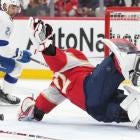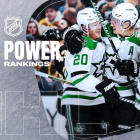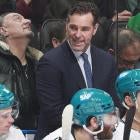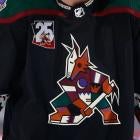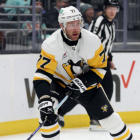NHL previews: Atlantic Division | Metropolitan Division | Central Division | Pacific Division
The NHL's rules surrounding fighting seem to be quietly chipping away at the number of fights we'll see in the league. Most notably, there is the helmet rule, in which players cannot remove their own helmets before a fight without receiving an extra minor penalty for doing so. However, another rule, which has been on the books for a while now, reared its head in a big way in Thursday night’s game between the Dallas Stars and Florida Panthers.
In the first period of Thursday night's contest, a pair of altercations sparked after Panthers goalie Tim Thomas took a little extra contact.
Dallas' Antoine Roussel and Florida's Mike Weaver became immediately entangled and started throwing punches. Close to the play, Panthers defenseman Dmitry Kulikov and Stars forward Ryan Garbutt were already wrapped up in a tussle. They dropped the gloves shortly after Roussel and Weaver did. Both Kulikov and Garbutt were ejected.
For the Panthers, that's a pretty awful tradeoff, losing one of their best defenseman for most of the game while Dallas lost a forward from the bottom of the lineup.
Why did they get tossed? NHL Rule 46.7, "Fighting after the original altercation." The rule states:
A game misconduct penalty shall be imposed on any player who is assessed a major penalty for fighting after the original altercation has started.
Notwithstanding this rule, at the discretion of the Referee, the automatic game misconduct penalty may be waived for a player or goalkeeper in the altercation if the opposing player was clearly the instigator of the altercation.
To the letter of the law, the officials probably got it right, but Kulikov and Garbutt seemed sure to come to blows after wrapping up. They just happened to drop their gloves a little bit after Roussel and Weaver, who were each assessed the regular fighting majors. Roussel also received an instigator penalty.
In terms of the rule, it's actually a good one. It prevents the frequency of often unnecessary line brawls and tries to at least limit some of the fighting to single altercations to keep games from getting out of hand. However, it would appear the officials, at least in this game, called it more strictly than usual.
According to Harvey Fialkov of the South Florida Sun Sentinel, Panthers general manager Dale Tallon and assistant GM Mike Santos were none too pleased with the ejections coming out of the dual fights.
such a rush on deadline last night didnt even see Goc. Tallon and Santos say secondary fighting ejection rule is a joke. #flapanthers
— Harvey Fialkov (@hfialkov) October 4, 2013
It's a joke when it doesn't work as intended. In this case, the referees should be able to use a little more discretion. With four players essentially engaged at nearly the same time, it's hard to really fault Garbutt and Kulikov for going at it. They may not have even been able to notice what Roussel and Weaver were doing, but it's not like they're just going to skate away because the other two guys are fighting.
However, if this is a rule the NHL wants to see enforced more stringently, then Thursday night could be a sign of things to come.
The rule cost the Panthers one of their best players, and even though Florida won, Tallon knows with the depth on his roster the Panthers can ill afford to lose players, especially when it seems unnecessary. His reaction is certainly not without merit.
The big fight between Toronto's Colton Orr and Montreal's George Parros -- that ended with the latter leaving the ice on the stretcher -- was also a secondary altercation. Both were ejected anyway. A rule like this obviously isn't going to stop those two, who are essentially designated face punchers, but it should prevent guys like Kulikov or other vital players from engaging in secondary altercations, which is probably what the NHL is hoping for.
This is a rule the NHL could probably tweak a bit, but don't expect it to. Fighting's end, which is probably going to come someday, could be a death by a thousand paper cuts. Rules like requiring helmets to be left on and stemming secondary altercations are really just the tip of the iceberg.
Expect more as the league continues to quietly erode fighting without ever outright banning it.














